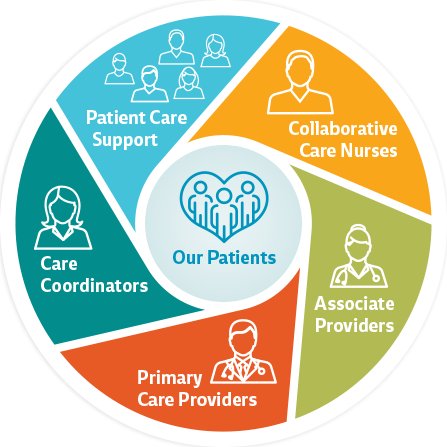A medical “home” isn’t a building or place; it is an innovative way of providing coordinated health care services. Your primary care provider (PCP) and their partnered associate provider are members of a coordinated team that offers comprehensive care all under one “roof.” Each expert on your team works on a piece of your overall care, collaborating so we are all on the same page, and able to better care for you as a whole person, throughout your life.
Your home team has got you covered for all your health care needs, including:
- Coordinating support services, such as Financial Counseling
- Educating you on how to best manage your medical conditions
- Following up on tests and recommendations
- Facilitating transitions of care, such as going home after a hospital stay
- Managing appointments to help you get the most from every visit
- Prescribing and monitoring medications
- Providing behavioral health support for issues like sleeplessness or depression
- Tracking records and paperwork, so we are always on top of your care
Who is on my medical home team?
Your team may differ depending on your unique medical needs. For example, a team for someone with a common condition such as high blood pressure or diabetes might include physicians, advanced practice nurses, physician assistants, specialized nurses, pharmacists, nutritionists, collaborative care nurses, behavioral health specialists, and care coordinators. Under the direction of a PCP, this team works together to meet all the patient’s health care needs.
The center of your team
- You (the patient)
- Your family
- Your PCP, who is a doctor, nurse practitioner, or physician assistant. PCPs collaborate with their associate provider partners and other members of your team to address your specific health concerns. They also work with you to create health and wellness goals and a plan to reach those goals.
- Associate provider who works very closely with your PCP—in the same office— to ensure your current treatment plans are being followed. They diagnose, as well as prescribe treatment and medication. With both your PCP and associate provider working together to design your care plan, you get the most complete care.
Collaborating for the best care
This model generates better health outcomes, and we have the data to back that up. We have better outcomes with diabetics, better screening rights, better care because our patients engage with the team.
Andrew Tremblay, MD, department chair, Primary Care and Family Medicine
These team members provide support beyond routine and preventative care:
- Care coordinators works with you to remove barriers to following your care plan when you are returning home from a hospital stay or a nursing home.
- Collaborative care nurses (CCNs) works closely with you and your PCP to help manage chronic conditions. With ongoing check-ins, you and your CCN focus on education, mentoring, and health coaching. CCNs also oversee lab tests and health screenings, and monitor the progress of preventative care protocols.
- Results management nurses contact you with test results and your PCP’s recommendations. They communicate directly with your PCP to help answer your questions about test results and arrange appropriate follow-up care.
- Specialized nurses in the Nurse Clinic support all Cheshire Medical Center’s primary care teams, offering specialized services such as wound care, administration of special medications such as IV antibiotics, and our Anticoagulation Clinic.
Patient care support
Every member of a primary care team is important in delivering you the best care, whether their support allows your PCP to spend more time listening to your concerns, or they have specialized expertise to offer. Some of these other members of your care team include:
- Behavioral health consultants
- Call center receptionists
- Form managers
- Medication renewal managers
- Patient flow staff
- Registry coordinators
- Results management nurses
- Team phone nurses
Connections beyond primary care
Many medical conditions require treatment from specialists, our Primary Care Urgent Visits team, or the Emergency Department. Some also benefit from care provided at other Dartmouth Health locations, like the Dartmouth Health Children's or Dartmouth Hitchcock Medical Center. Your medical home team commits to staying on the same page with these specialists, so we can help manage every aspect of your care.
One way we do this is with shared electronic medical records. With the push of a button, your specialist can alert your PCP to changes in your care plan, and your results management nurse sees your specialist’s orders for tests so they can follow up on your care—wherever you are seen within the Dartmouth Health system.
You can also access your records, schedule appointments and contact all your Dartmouth Hitchcock Medical Center and Clinics providers through myDH. Learn more about using myDH to get the most out of your care.

